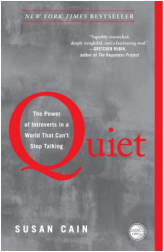
Too often one hears a claim that a certain book "changed my life." While in most cases, this is nothing more than hyperbole, I believe reading Susan Cain's may actually have changed mine.
For years I've wondered why certain circumstances in life made me either happy or miserable, and I had grown comfortable with my explanation that I was just cranky and weird. I never gave psychology or personality traits a moment's thought. I assumed much of it was just hokum anyway.
But recently, as part of a staff development day at work, I took a Myers-Briggs test for the first time, and I was surprised by the results and implications. It turns out I'm a very marked introvert, yet had someone asked me if I were more introverted or extroverted before, I probably would have responded the latter. After all, I've been a teacher on and off for 18 years, which means public speaking and "performing" 180 days a year. And before that I was a musician performing on stage in concert halls with hundreds of audience members. And now I'm a speech and debate coach. (Go figure!)
But Cain's book puts all of that in a context I had never appreciated before. It's now very clear to me why I've enjoyed some parts of my professional life and dreaded others. (And "dread" may not be a strong enough word for what goes through me some days.) It explains why the happiest years of my life professionally were when I was writing my two books, even though my personal life was in turmoil. It explains why when I have to be "on" that I need time afterwards to recover, why I prefer small and intimate gatherings and dislike cocktail party "happy talk." It explains so much...
The troubling result of reading this, however, is that it makes me question a lot of the career choices I've made (or have fallen into), and at my age, whether it's worth trying to move into a new direction that would be more fulfilling, but means starting again. Or is Thoreau's "life of quiet desperation" my lot in life? Much to consider.
For years I've wondered why certain circumstances in life made me either happy or miserable, and I had grown comfortable with my explanation that I was just cranky and weird. I never gave psychology or personality traits a moment's thought. I assumed much of it was just hokum anyway.
But recently, as part of a staff development day at work, I took a Myers-Briggs test for the first time, and I was surprised by the results and implications. It turns out I'm a very marked introvert, yet had someone asked me if I were more introverted or extroverted before, I probably would have responded the latter. After all, I've been a teacher on and off for 18 years, which means public speaking and "performing" 180 days a year. And before that I was a musician performing on stage in concert halls with hundreds of audience members. And now I'm a speech and debate coach. (Go figure!)
But Cain's book puts all of that in a context I had never appreciated before. It's now very clear to me why I've enjoyed some parts of my professional life and dreaded others. (And "dread" may not be a strong enough word for what goes through me some days.) It explains why the happiest years of my life professionally were when I was writing my two books, even though my personal life was in turmoil. It explains why when I have to be "on" that I need time afterwards to recover, why I prefer small and intimate gatherings and dislike cocktail party "happy talk." It explains so much...
The troubling result of reading this, however, is that it makes me question a lot of the career choices I've made (or have fallen into), and at my age, whether it's worth trying to move into a new direction that would be more fulfilling, but means starting again. Or is Thoreau's "life of quiet desperation" my lot in life? Much to consider.
 RSS Feed
RSS Feed
